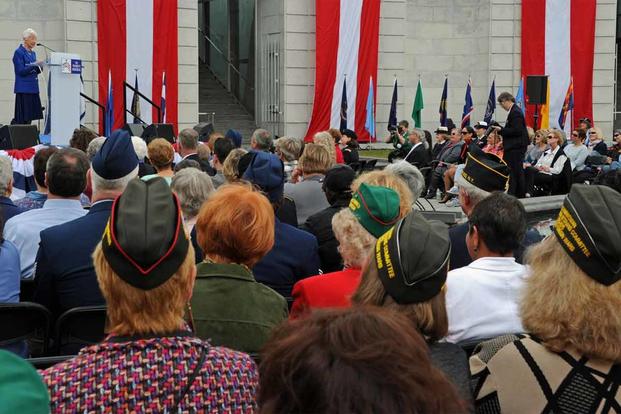The Department of Veterans Affairs wants thousands more female veterans to enroll in its Million Veteran Program -- a blood repository used by researchers to tackle the world's toughest medical questions.
The program, which began in 2011, has created the largest biobank on the planet, with 841,000 participants. The genetic material in the repository, managed by the Boston VA Healthcare System, has been used for studies on various types of cancer, cardiovascular disease, Alzheimer's, diabetes and mental health disorders, such as post-traumatic stress disorder.
Just 75,000, or 9%, of the participants are women -- a shortcoming that skews the outcome of medical research and can leave gender-specific health questions unanswered, said Sumitra Muralidhar, director of the Million Veteran Program.
"Historically, women are under-represented in biomedical research and especially when it comes to biomedical research," Muralidhar said. "There are differences in anatomy, biology and physiology in men and women and so it's really important to understand what factors influence health and disease in women."
Read Next: WATCH: Pentagon Releases Video of Airstrikes on Militia Facilities in Syria
Enrollment involves completing a questionnaire and providing a finger-prick blood sample at one of the VA's 65 participating medical centers or completing online registration followed by sample donation at a VA health facility.
Once enrollment is complete, the identities of donors are kept secret from researchers, and all samples are labeled with a code rather than with any identifying information.
The samples are, however, linked to their corresponding veterans' medical records, albeit with identifying information stripped out. Each sample also comes with completed questionnaires on lifestyle and employment, including combat experience and toxic environmental exposures.
Veterans' extensive medical histories and records, along with the genetic material, allow researchers to delve into the myriad factors that may contribute to medical issues, according to Muralidhar.
The biobank has already provided the basis for 65 research studies, with 30 more to come.
"For researchers, they are looking at numbers, how many have the disease and how many don't, and the genetics -- if you have this particular genetic change, do you have the disease or not. And then they go about trying to figure out what is causing it," Muralidhar said.
Women currently make up roughly 10% of the U.S. veteran population, but are expected to account for more than 18% by 2040.
The effort to enroll more women in the program -- VA is aiming for 5,000 more by the end of the fiscal year -- comes as the Veteran Health Administration increases services for female veterans. Lawmakers have also been calling for improvements in gender-specific health care to accommodate this growing veteran cohort.
House lawmakers introduced a VA funding bill last week that provides $778.5 million for women's health, more than $73 million above the amount requested in the Biden administration's fiscal 2022 budget.
Muralidhar said the program has been successful in recruiting Black veterans, with roughly 20% of enrollees identifying as Black or African American. The department would like to enroll more Native Americans, Asian Americans, Hispanics and other ethnic or racial groups as well, for the same reasons it needs more women, she added.
"There are all these differences, and then you layer gender as well as disease conditions. You can see how this is complex and the larger numbers you have the more questions you will be able to answer with respect to all the conditions you see in veterans," she said.
Before the pandemic, VA enrolled roughly 100,000 veterans each year in the program. The department hopes to reopen all its enrollment centers by the end of July, Muralidhar said. Veterans also can go online to complete their surveys and make an appointment for a blood draw.
The department also is piloting a program that would let veterans provide a specimen via finger prick at home, she added.
Veterans interested in enrolling in the program can find more information at the VA's Million Veterans Program web site.
-- Patricia Kime can be reached at Patricia.Kime@Monster.com. Follow her on Twitter @patriciakime.
Related: Full Senate to Take Up 'Deborah Sampson' Landmark Bill on Female Veterans' Health












